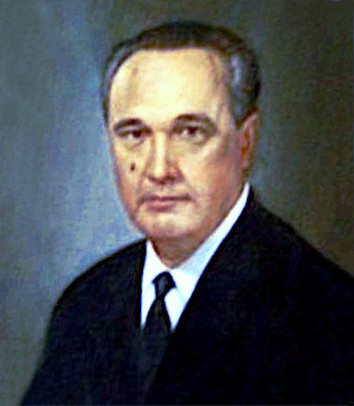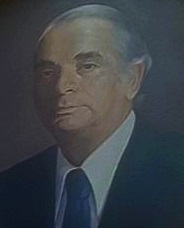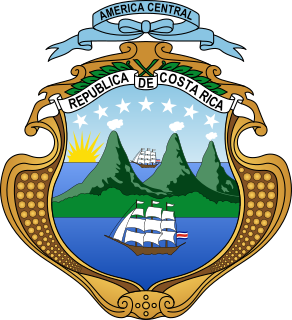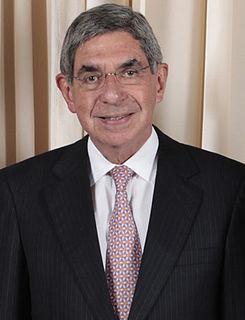| ||||||||||||||||||||
| Turnout | 81% | |||||||||||||||||||
| ||||||||||||||||||||
In green provinces won by Oduber, blue Trejos | ||||||||||||||||||||
| ||||||||||||||||||||
 |
|---|
| This article is part of a series on the politics and government of Costa Rica |
Legislature |
|
General elections were held in Costa Rica on 6 February 1966. [1] José Joaquín Trejos Fernández of the National Unification Party won the presidential election, whilst the National Liberation Party won the parliamentary election. Voter turnout was 81.4%. [2]

Costa Rica, officially the Republic of Costa Rica, is a country in Central America, bordered by Nicaragua to the north, the Caribbean Sea to the northeast, Panama to the southeast, the Pacific Ocean to the southwest, and Ecuador to the south of Cocos Island. It has a population of around 5 million in a land area of 51,060 square kilometers. An estimated 333,980 people live in the capital and largest city, San José with around 2 million people in the surrounding metropolitan area.

José Joaquín Antonio Trejos Fernández was 35th President of Costa Rica from 1966 to 1970. His parents were Juan Trejos Quirós and Emilia Fernández Aguilar. As a student he obtained degrees in mathematics and economics from the University of Costa Rica. During Mario Echandi's administration he was part of Costa Rica's delegation in the United Nations. Trejos defeated Daniel Oduber in the election that secured him the presidency. Trejos died on 10 February 2010.
The National Unification Party was a political party in Costa Rica from 1966 to 1978. It was founded by Rafael Ángel Calderón Guardia and Otilio Ulate Blanco, and espoused social welfare and a free market.
Contents
These were very divisive elections as they had only two candidates. [3] On one hand the government party PLN nominated the Ministry of Foreign Affairs Daniel Oduber Quirós, whilst all the right-wing opposition joined forces and former enemies Rafael Calderón and his National Republican Party (Social Christian) merged with Otilio Ulate’s National Union (Liberal-Conservative) in the National Unification Coalition. Calderón and Ulate were enemies during the 1948 Civil War but put aside their differences and they agree that none of them will be candidate. [3]

The National Liberation Party, nicknamed the verdiblancos, is a political party in Costa Rica. The party is a member of the Socialist International.
In many countries, the Ministry of Foreign Affairs is the government department responsible for the state's diplomacy, bilateral, and multilateral relations affairs as well as for providing support for a country's citizens who are abroad. The entity is usually headed by a foreign minister.

Porfirio Ricardo José Luis Daniel Oduber Quirós was a Costa Rican politician, lawyer, philosopher, poet, and essayist. He served as the President of Costa Rica from 1974 to 1978. He is credited with the creation of the Sistema Nacional de Radio y Televisión and the Universidad Estatal a Distancia.
The Coalition look forward a “neutral” candidate that could unified the opposition and college professor and economist José Joaquín Trejos was selected. [3] Trejos had never hold a public office before. [3]

An economist is a practitioner in the social science discipline of economics.
Left-wing opposition was outlawed as the Legislative Assembly made effective the article 98 of Costa Rica’s Constitution at the time that forbid Communist parties, making illegal the only party at the left of PLN, the Popular Democratic Action (PADA) led by Manuel Mora.

The Legislative Assembly is the unicameral legislative branch of the government of Costa Rica. The national congress building is located in the city capital, San José, specifically in El Carmen District in San José Canton.

The Constitution of Costa Rica is the supreme law of Costa Rica. At the end of the 1948 Costa Rican Civil War, José Figueres Ferrer oversaw the Costa Rican Constitutional Assembly, which drafted the document. It was approved on 1949 November 7. Several older constitutions had been in effect starting from 1812, with the most recent former constitution ratified in 1871. The Costa Rican Constitution is remarkable in that it abolished the Costa Rican military, making it the first nation to do so by law. Another unusual clause include an amendment asserting the right to live in a healthy natural environment.
Popular Democratic Action was a political party in Costa Rica, founded in 1962 by left-wing members of the National Liberation Party. Prominent founders were Enrique Obregón Valverde, Marcial Aguiluz Orellana and Julio Sunol. The party received some support from the then-illegal communist party. The party won two seats in the elections that year, although Valverde received less than 1% of the vote in the presidential election. Sunol later left the party.
The campaign was particularly ideological, as the two candidates were basically encompassing the only Right-Left options and were defenders of two very different ideologies; Oduber (and PLN) abide to democratic socialism and Trejos was conservative. The debate centered on both opposing philosophies; Trejos accused PLN of statism and been smothering the private enterprise, whilst Oduber accused Trejos of been a supported by the richest of the rich and trying to bring down Costa Rica’s social justice and labor laws. [3]
Democratic socialism is a political philosophy that advocates political democracy alongside social ownership of the means of production, with an emphasis on self-management and democratic management of economic institutions within a market or some form of decentralized planned socialist economy. Democratic socialists espouse that capitalism is inherently incompatible with what they hold to be the democratic values of liberty, equality and solidarity; and that these ideals can only be achieved through the realization of a socialist society. Democratic socialism can be supportive of either revolutionary or reformist politics as a means to establish socialism.
In political science, statism is the belief that the state should control either economic or social policy, or both, to some degree.
Social justice is a concept of fair and just relations between the individual and society. This is measured by the explicit and tacit terms for the distribution of wealth, opportunities for personal activity, and social privileges. In Western as well as in older Asian cultures, the concept of social justice has often referred to the process of ensuring that individuals fulfill their societal roles and receive what was their due from society. In the current global grassroots movements for social justice, the emphasis has been on the breaking of barriers for social mobility, the creation of safety nets and economic justice.
In one of the most hard-fought elections in Costa Rica’s history, Trejos won by a small difference of around 2000 votes (one of Costa Rica’s slightest differences between two candidates), [3] though PLN kept its parliamentary majority (thus many of Trejos’ reforms did not passed). Far-right Revolutionary Civic Union Party won two seats in Parliament. The results were accepted by all sides and many historians seem this election as the evidence that the dark times of civil unrest and conflict after electoral processes that end in the Civil War were put behind for good. [3]















